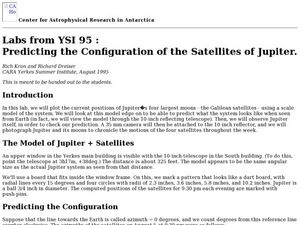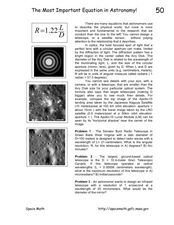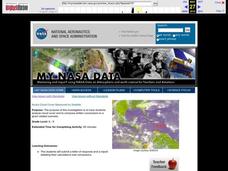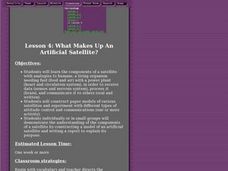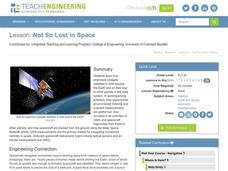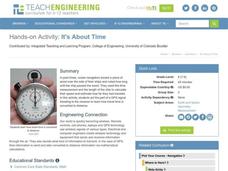Curated OER
Predicting the Configuration of the Satellites of Jupiter
Students plot the positions of the planet Jupiter while predicting what the configuration system looks like from Earth. For this configuration of satellites lesson, students photograph Jupiter and its moons to record the motions of the...
Curated OER
Creativity in Science
Learners research the different satellites and their uses. In this satellite instructional activity students study the different job roles in the development of satellites and web pages.
Curated OER
Geography from Space
Students explore geography as seen from space. In this web-based lesson, students brush up on geography skills by identifying geographic locations based on satellite or aerial images and a brief clue.
Curated OER
I Know Where You Are!
High schoolers study what a GPS is and use it to challenge themselves and find positions on a map. In this investigative lesson students find various points on a map using a GPS system and answer questions on a worksheet.
Curated OER
Do You Have Change?
Students analyze data and complete a worksheet about land use change in a coastal region. In this land use lesson, students discuss events that cause land use changes in coastal areas. They construct a change table to summarize data on...
Curated OER
Texture - Bumpy, Wrinkled, Smooth?
Students study textures and identify textures using satellite images. In this texture lesson, students study various objects and define their textures. Students feel crayon rubbings and sort them into groups. Students use a book with...
Curated OER
Google Earth Scavenger Hunt
Students complete activities to learn how to use Google Earth and study Alaska. In this Google Earth lesson, students complete a Google Earth scavenger hunt to find facts about Alaska. Students complete two worksheets for the topic.
Curated OER
Sea Ice and Satellites
Students study satellites and satellite images using Google Earth. For this satellite lesson, students discuss satellites and how they work. Students watch a demonstration of how satellites work and learn what they are used for. Students...
Curated OER
The Most Important Equation in Astronomy!
In this astronomy optics learning exercise, students calculate the angular resolution and maximum resolution for given telescope specifics. This learning exercise has 3 problems to solve.
Curated OER
Moon Walk
Students actively listen to a lecture lesson about the moon. In this moon lesson, students explore the moon's surface and human exploration of the moon. They also learn about the inventions created by engineers to help us learn more...
Curated OER
Our Solar System
In this solar system worksheet, students read about the planets, asteroids, meteoroids, comets, and the moon. Then students complete 25 multiple choice, 4 true or false, and 3 short answer questions.
Curated OER
Space Puzzle
For this space puzzle, students identify names of spacecraft, planets, and items placed in space. A list of 18 words are provided for students to identify.
Curated OER
Solar System 2
In this space worksheet, students identify and locate vocabulary terms and names related to the Solar System. There are 31 words located in the puzzle.
Curated OER
GPS Worksheet
In this GPS worksheet, learners complete 6 fill in the blank questions about GPS satellite signals, receiver units and the acronyms used in GPS technology.
Curated OER
How Wet Did It Get?
Students measure the rainfall/snowfall on the playground on a rainy/snowy day with a rain/snow gauge. They draw a bar graph representing the amount of water that fell and observe a satellite image of the clouds and local weather system...
Curated OER
Studying Exothermic and Endothermic Reactions
Pupils explore the mesosphere and lower thermosphere globally and achieve a major improvement in our understanding of the fundamental processes governing the energetics, chemistry, dynamics, and transport of the atmospheric region. They...
Curated OER
Aruba Cloud Cover Measured by Satellite
Students analyze cloud cover and to compose written conclusions to a given related scenario. They submit a letter of response and a report detailing their calculations and conclusions.
Curated OER
Trends of Snow Cover and Temperature in Alaska
Students compare NASA satellite data observations with student surface measurements of snow cover and temperature. They practice data collection, data correlations, and making scientific predictions.
Curated OER
What Makes Up An Artificial Satellite?
Students discover the components of a satellite using analogies to humans in a class discussion and participate in an activity in which they construct a paper model of a satellites and experiment with different types of attitude control...
Curated OER
A Look At Sunspots
High schoolers research how the development of new technology has increased our knowledge of how the sun works. This lesson is part of a three-part series aimed at showing students how our knowledge of the universe must be inferred...
Curated OER
Not So Lost in Space
Students investigate how engineers navigate satellites in orbit around the Earth and on their way to other planets in the solar system. They study vocabulary words and participate in studying a satellite by learning about times and...
Curated OER
TE Lesson: Navigating at the Speed of Satellites
Students study the basic concepts of the Global Positioning System and how it increases the accuracy of navigation. They examine trilateration and how the speed of light is used to calculate distances.
Curated OER
It's About Time
Middle schoolers investigate how Global Positioning Systems work and how and why GPS receivers make errors. They graph data points and apply estimation and prediction to real-life GPS situations, discuss time delay, and complete a...
Curated OER
Altimetry
Fifth graders accurately measure the distance to eight points on an uneven surface by conducting a simulation of sattelite altimetry. They create a two-dimensional model of the simulated ocean surface by graphing data from the Radar Run...


